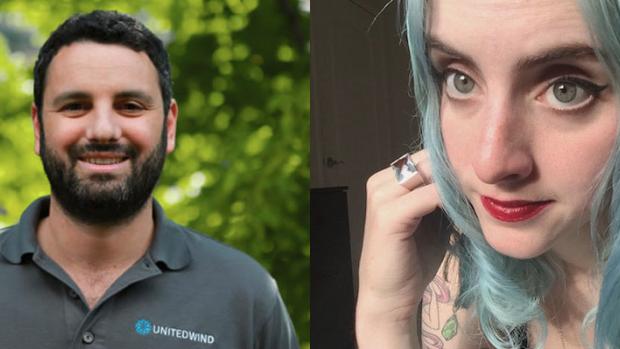A Great Year for Grads
2016 is off to a sensational start

Whether they were game-developing master’s candidates or companies who’ve moved on from an NYU business incubator to the big time, 2016 is shaping up to be a banner year for our graduates. The two featured here—one who was named to a prestigious Forbes list and another who attracted the largest-ever single investment in small wind-turbine projects (a cool $200 million)—credit much of their success to their time at the NYU Tandon School of Engineering.
Generating Wind Power (and Plenty of Buzz)
Russell Tencer is the founder and CEO of United Wind, Inc., which got its start as part of the inaugural class of businesses at the New York City Accelerator for a Clean and Renewable Economy (NYC ACRE), then housed at the NYU Tandon School of Engineering’s Varick Street Incubator. “When NYC ACRE opened in 2009, there was intense competition to get chosen as one of the start-ups that would work in the space,” Tencer recalls. “Then, once you were in, there was equally intense competition to see which start-up would be able to graduate from the incubator and make it on their own.”
The company, known originally as Wind Analytics, graduated from the incubator in 2011 and recently announced that it had won $200 million in backing from a Toronto-based investment firm. The funding will allow Tencer and his colleagues to greatly expand their pioneering practice of leasing wind turbines to farms, industrial facilities, and rural homes.
“We began back at NYC ACRE building software that helped property owners and developers decide if wind energy could effectively be harvested at a site,” Tencer says, explaining that the program analyzed financial ramifications and wind conditions, among other factors. “Then we realized that we had come up with a great tool and that we, ourselves, should be using it.”
Basing their new business model on one that has been used with success in the solar-power industry, United Wind now leases small, 10- to 100-kilowatt turbines, which would normally sell for at least $80,000, with no upfront cost to property owners. The turbines produce between 50 and 100 percent of a user’s electricity needs and significantly lower their overall energy costs.

Explaining that the national goal is to reach 30 gigawatts worth of turbine installations by 2030, Jennifer Jenkins, the executive director of the Distributed Wind Energy Association, told a New York Times journalist, “I think [United Wind is] going to transform the market, and we’re going to be able to get to these potential numbers that we’ve been forecasting for a long time.”
While Tencer is increasingly busy—the last round of funding, he projects, will allow United Wind to complete some 1,000 projects in the Northeast and Midwest in the coming days—he’s happy to take time to reminisce about his days at NYC ACRE. “Being a part of the NYU incubator system gave us so many advantages,” he says. “Right off the bat, we were in the bullpen with other dynamic, hard-working entrepreneurs, and that makes for a very motivational environment. Additionally, because the incubator hosted regular events, we got to tell our story to the media, investors, and potential customers. It helped us build a lot of momentum as a company and is a major factor in our current success. We’re very fortunate to be graduates of an NYU Tandon School of Engineering incubator.”
A Game Changer in the World of Gaming
Before she was being called one of 2016’s 30 most important young figures in the gaming world by Forbes magazine or the “Punk Poet of Gaming” by the London Guardian, Nina Freeman had a different label: NYU Tandon School of Engineering student.
The creator of several “thoughtful, personal” games (as the editors of Forbes characterized them), Freeman earned her master’s degree in Integrated Digital Media here in 2015.
Her path to the MetroTech Center and NYU’s Media and Games Network (MAGNET) was far from a straight one, however. While Freeman enjoyed playing classic titles like Super Mario and Legend of Zelda when she was young, and she became an aficionado of Final Fantasy XI as a teen, as an undergraduate at Pace University, she had studied poetry and set her sights on a writing career.
It was not until she began suffering from a chronic illness and found herself with large amounts of downtime that she thought of teaching herself computer programming and creating her own games—and later, of enrolling at the School of Engineering. Freeman had been inspired, in some part, by meeting Emmett Butler and Diego Garcia, NYU students and aspiring game designers who were active in the city’s thriving independent-gaming community and who introduced her to many quirky, low-profile titles she had never before played.
In late 2012 she programmed her first game, using Python and basing it on a science fiction-themed poem she had written during college. (With her programming skills gradually improving, the following year Freeman helped co-found Code Liberation, a nonprofit group dedicated to teaching women to code.)
In the fall of 2013, she began her Integrated Digital Media studies. “I realized that MAGNET, which was just being launched, was going to be a major nexus for independent game designers and would present a lot of opportunities for collaborative work and learning,” Freeman says. “There were so many professors and instructors there who encouraged me—including Luke DuBois, De Angela Duff, and Phoenix Perry—and Bennett Foddy ended up being a very important mentor.”
Just a few months after starting her classes, Freeman took part in an NYU Global Game Jam, where she and a group of collaborators created How Do You Do It, a game whose players assume the role of a young girl exploring the mechanics of sex by manipulating two dolls. The game—decidedly more raw and personal than many—attracted attention among cognoscenti, and the buzz only increased in 2015, when Freeman introduced Cibele, which had its genesis as her thesis project.

A screenshot from the game, Cibele
Cibele is based on a period in Freeman’s own life; at 19, she had met a man while playing a massively multiplayer online (MMO) game and embarked on a relationship with him that culminated in a single real-life meeting. The game recreates Freeman’s desktop circa 2009, allowing players to explore photos, poetry, and e-mails, and in another section, to take part in Valtameri, a simplistic MMO whose real purpose within the world of Cibele is to enable users to eavesdrop on the increasingly romantic audio chat between the young protagonist and a male player in the game-within-a-game.
Freeman is currently working on a futuristic story-exploration game for Fullbright, a West Coast-based company responsible for some of the games that have most inspired her. It is, she says, a “dream job”—and one that she might never have gotten without her time at MAGNET. “Working at Fullbright, being named to the Forbes 30 under 30 list . . . I owe a lot of what I’ve accomplished to my professors, mentors, and the strong community of game makers I met at NYU,” she asserts.




